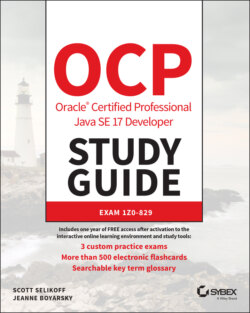Читать книгу OCP Oracle Certified Professional Java SE 17 Developer Study Guide - Jeanne Boyarsky - Страница 146
Casting Values
ОглавлениеSeems easy so far, right? Well, we can't really talk about the assignment operator in detail until we've covered casting. Casting is a unary operation where one data type is explicitly interpreted as another data type. Casting is optional and unnecessary when converting to a larger or widening data type, but it is required when converting to a smaller or narrowing data type. Without casting, the compiler will generate an error when trying to put a larger data type inside a smaller one.
Casting is performed by placing the data type, enclosed in parentheses, to the left of the value you want to cast. Here are some examples of casting:
int fur = (int)5; int hair = (short) 2; String type = (String) "Bird"; short tail = (short)(4 + 10); long feathers = 10(long); // DOES NOT COMPILE
Spaces between the cast and the value are optional. As shown in the second-to-last example, it is common for the right side to also be in parentheses. Since casting is a unary operation, it would only be applied to the 4 if we didn't enclose 4 + 10 in parentheses. The last example does not compile because the type is on the wrong side of the value.
On the one hand, it is convenient that the compiler automatically casts smaller data types to larger ones. On the other hand, it makes for great exam questions when they do the opposite to see whether you are paying attention. See if you can figure out why none of the following lines of code compile:
float egg = 2.0 / 9; // DOES NOT COMPILE int tadpole = (int)5 * 2L; // DOES NOT COMPILE short frog = 3 - 2.0; // DOES NOT COMPILE
All of these examples involve putting a larger value into a smaller data type. Don't worry if you don't follow this quite yet; we cover more examples like this shortly.
In this chapter, casting is primarily concerned with converting numeric data types into other data types. As you will see in later chapters, casting can also be applied to objects and references. In those cases, though, no conversion is performed. Put simply, casting a numeric value may change the data type, while casting an object only changes the reference to the object, not the object itself.
